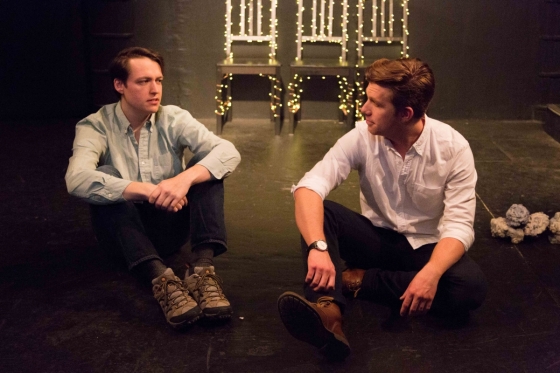
A chance meeting in a high school physics class kicks off the narrative of Bronx-born playwright Toni Press-Coffman's Touch. Kyle (Josh Triplett) gets to know quirky free-spirit Zoë after she pokes her head into the wrong Arizona classroom. After graduation, they marry, and Kyle channels his lifelong love of science center into a career in astronomy. Aside from some of the usual marital disagreements, their relationship brings out the best in one another, until, on one Thanksgiving spent with Kyle's childhood friend Bennie (Alex Etling) and Zoë's sister Serena (Cassie Wood), a random act of violence alters the course of all of their lives.
Much of Touch recounts the past, but it shifts regularly and seamlessly between memory and developments in the play's present, as well as among action and narration and, less often, narrative voices. The majority of the storytelling burden, including tricky emotional shifts, falls on Kyle, and Triplett capably shoulders that burden, playing both a young man in love and a man who feels like he has lost everything with equal conviction. Etling and Wood are strong supporting actors, helping Triplett to create the character of Zoë, who exists for the audience only in the words and memories of the other characters; Triplett and Etling's portrayal of the lifelong friendship between Kyle and Bennie is convincing, and Wood contributes to our understanding of Zoë's character in Serena’s role as devoted big sister. The minimalist set dressing consists of three chairs and a window frame wrapped in tiny lights suggestive of the stars that Kyle loves and has devoted his life to. (It was admittedly hard to figure out if chairs being lit or not at various points was symbolic in some consistent way or merely an aesthetic choice.) Astronomy and physics provide many of the central metaphors here: entropy -- the inescapable tendency of any closed system towards chaos over time; the light of supernovas, a statistically rare privilege to witness; the heavenly debris, or "stardust," that is part of human beings on an elemental level. Another layer of symbolism is provided by Kyle's longstanding love of the poetry, particularly the lesser-known titles, of John Keats (others prefer Eliot or Byron), whose brief but shining life and his sense of wonder at the world make the lines from his poetry resonate.
One of the central questions that Touch uses all of this to ask is what the goal of grieving is. When we want to "help" someone who has experienced grief or loss, what does that really mean? And what should it mean? The touch of the play's title represents a physical manifestation of human connection; it surfaces as a climactic point in Zoë's story, as well as in the character of Kathleen (Kiley Caughey), who provides an unexpected and admirably humanized avenue of help for Kyle to reconnect to himself and to other people. Her character type is not uncommon, but Kyle and the play’s defense and justification of their relationship are, and are welcome. Ultimately, considering some of its dark subject matter, the message of Touch is one of perhaps surprising hope, optimism, and possibility, and the members of the Cave Theatre Co. give life and dimension to the material. - Leah Richards & John Ziegler
